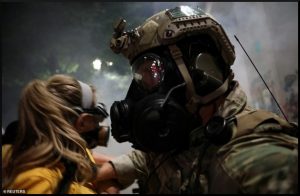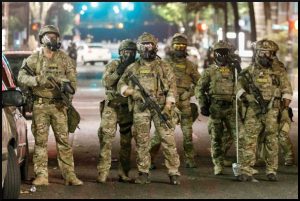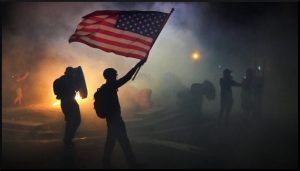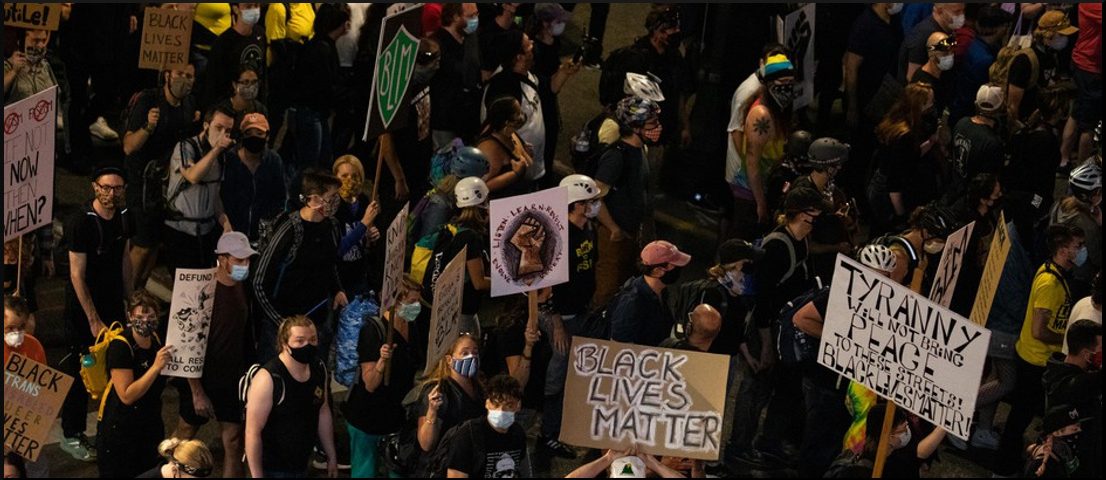by Kevin Zeese and Margaret Flowers, published on Popular Resistance, July 26, 2020
Today is the 60th day of protests since the murder of George Floyd. This weekend, people marched in cities across the country in solidarity with Portland and in opposition to the US becoming a police state.
President Trump sending troops to cities added fuel to the nationwide uprising against racist police violence. Protests have grown not only in Portland but in Seattle, Chicago, Philadelphia, Minneapolis, Omaha, Austin, Oakland, San Francisco, New York, and Washington, DC, among other cities.
Trump is not a ‘law and order’ president, he is a chaos and disorder president. He is mistaken to think that increasing conflict in cities throughout the country will save his failing 2020 campaign. Just as his hyped attack on Central American caravans backfired before the 2018 mid-term elections, this escalation is also backfiring as people are mobilized to stand against Trump’s authoritarianism.
While Trump’s actions are the focus of current protests, Portland demonstrates there is a long history of police violence that preceded Trump. Mayors have allowed police violence and Joe Biden, when he was Chair of the Judiciary Committee, authored legislation that led to over-policing and encouraged police militarization. While Trump sending in militarized troops to cities needs to be opposed, police violence is bigger than Trump.
Trump Sends In Federal Troops, Escalates Violence

While federal officers protect federal buildings across the country that is not what Trump is doing. He is using the excuse of protecting federal buildings as cover for sending in federal troops to dominate cities.
On June 1, President Trump made his plan clear warning governors that if they did not get control of the cities, he would send in troops. He told governors
“You have to dominate, if you don’t dominate you’re wasting your time.”
June 1 was also the day that National Guard troops in Washington, DC fired tear gas, pepper spray and rubber bullets into non-violent protesters in Lafayette Park across from the White House so Trump could walk across the park for a widely denigrated photo-op holding a bible in front of St. John’s church. Trump said last week that he sent personnel to Portland because “the locals couldn’t handle it.”
The presence of federal troops in Portland and being sent to other cities is based on an executive order signed on June 26 to protect “Federal monuments, memorials, statues, or property.” Homeland Security director, Chad Wolf, created a task force made up of Border Patrol, Coast Guard, U.S. Marshals, and other agencies. Three different operations have been announced: Wolf’s “Protecting Americans Communities Task Force”; the Department of Justice’s crime-fighting “Operation Legend” announced on July 8; and “Operation Diligent Valor,” which includes the Portland police mission.
Legal analysts and commentators are debating whether the actions of federal troops in Portland are legal. The government argues they are merely protecting buildings and when they go blocks away they are investigating who damaged buildings. The Oregonian questions that writing, “Even if the federal agencies have legitimate license to defend the courthouse, ‘The real question is: Is it being used as a pretext?’”
It is evident from federal troop actions in Portland that this generalized federal policing is beyond federal authority. Reports and videos of unidentified Border Patrol agents in camouflage grabbing people off the street, stuffing them into unmarked vehicles, and driving off are unconstitutional, illegal actions.
Oregon officials including the governor and Portland mayor have asked Homeland Security to keep its troops off of Portland’s streets but Chad Wolf has refused. Oregon’s senators have also opposed Trump sending paramilitary squads to Portland.
Some, including the District Attorney of Philadelphia Larry Krassner, say federal troops should be prosecuted when they violate the law. The Oregonian reported that Steven Wax, a former Federal Public Defender, called on Oregon’s US attorney and the Multnomah County district attorney to convene grand juries with subpoena powers to investigate alleged criminal acts by federal officers. Potential charges could include kidnapping, assault, and racketeering conspiracy, he said. The district attorney and attorney general are conducting a criminal investigation focused on the injury of a protester, 26 year old Donovan La Bella, on July 11 who was shot in the head with an impact munition near the federal courthouse and subsequently needed surgery.
Oregon’s attorney general, the American Civil Liberties Union of Oregon, state legislators, and others have filed at least four lawsuits against federal agencies. US District Judge Michael H. Simon issued a 14-day order barring federal officers from targeting journalists or legal observers and said in court that he was disturbed by several images of federal officers using force against non-aggressive demonstrators. He noted the July 18 baton-beating of 53-year-old Navy veteran Chris David who tried to talk with federal officers outside the courthouse and the injury of La Bella.
As our guest on Clearing The FOG, constitutional lawyer Mara Verheyden-Hilliard makes the point that courts need to protect the rights of all people to protest and not make journalists and legal observers a separate category with greater rights than others. Hear our interview with Mara on The Militarized Assault on Our Right to Protest.
Paramilitaries Instead of the Military
We describe these federal agents as “troops” because that is what they are. President Trump threatened to use the Insurrection Act to deploy armed services to states but people in the military and legal scholars opposed him. Instead, Trump has sent militarized troops from civilian agencies into the cities.

The Department of Homeland Security sent Border Patrol Tactical Units (BORTAC) from Customs to Portland. BORTAC is an elite paramilitary unit that includes snipers and other highly trained troops who often operate outside of the US and are based along the Mexican border. These “Specialized Response Teams” wear the US Army’s camouflage and use military gear. BORTAC units have been deployed to war environments, including Iraq and Afghanistan. While not a violation of Posse Comitatus, which forbids the use of the military in domestic law enforcement, they subvert the intent of the Act.
An internal Homeland Security memo found the federal troops were not trained in riot control or mass demonstrations. It also stated this kind of federal action was “going to be the norm” so training was needed. Trump has promised to send troops to “Democrat” cities in an election year spectacle.
In addition to on-the-ground troops, the US is using the US Air Force ‘Cougar’ surveillance plane over Portland. The Intercept reports the flight data shows tight, circular surveillance flights over Portland. Steven Aftergood, director of the Federation of American Scientists’ Government Secrecy Project, asks “What is their mission? Under what authority are they operating, and who authorized them?”
Trump is using police as a prop in the 2020 election with Portland as a campaign stage. The campaign seeks to win votes in the suburbs, which he won by 4 percent in 2016 but is now losing by double digits. Trump’s re-election campaign has spent over $983 million in 2020, more than the $878 million spent in his entire 2016 campaign. Despite this spending, he is behind Biden by landslide margins in all of the battleground states. He fired his campaign manager and is obviously getting desperate.
Trump is mimicking the ‘law and order’ campaign of Richard Nixon but this is a different era when police violence and racism are on video for all to see. Protests after police murdered George Floyd took place in cities of all sizes and in many suburbs. A national consensus is developing that racist police violence exists and it must end. Images of militarized police shooting and tear-gassing unarmed protesters is likely to backfire against Trump.
Police Violence is Bigger Than Trump
Before the federal troops arrived, Portland police were using extreme violence and chemical weapons against protesters. The Portland Police Bureau already had a temporary restraining order for its violation of protesters’ free speech rights and another for arresting journalists and legal observers. Another court ruling largely prohibited local police from using tear gas, but that has not stopped federal troops from doing so. When Mayor Ted Wheeler, who also serves as the police commissioner, came to the courthouse protests people jeered him and signs called him ‘Tear Gas Ted.’ Wheeler was teargassed himself by the federal troops.
The Intercept describes how the Portland Police Association has dominated elected officials for decades. In meetings with the mayor, one police union president would put his gun on the table. The union contract protects racist cops making it hard to fire those who’ve used deadly force. When the new contract was being considered in 2016, people protested at City Hall and the police rioted forcing protesters outside where police in riot gear then surrounded the building as city officials approved their union contract.
The NY Times reports that of the 35 cities in the United States with populations larger than 500,000, Portland is the whitest with 71 percent of residents categorized as non-Latino whites and only 6% are Black. This stems from the state being founded as a state for white people. A 19th-century law called for whipping any Black person found in the state. In the early part of the 20th century, Oregon’s Legislature was dominated by members of the Ku Klux Klan. As the destination of Lewis and Clark, Oregon symbolized the conquest of the American West and the subjugation of Native peoples.
Police violence in Portland is disproportionately against Black people including being stopped by police and targeted with the use of force. Slate reports, “When the police chief banned chokeholds in 1985 after officers killed a Black man with the hold, officers made T-shirts that said, ‘Don’t Choke ’Em. Smoke ’Em.’ In 2012, the Justice Department reported that the PPB had an unconstitutional ‘pattern or practice’ of using excessive force against people with mental illnesses.” The Portland police have also been sympathetic to right-wing, white supremacist organizations when they demonstrated in the city.
With this history of white domination, some would think racist policing would not be a political issue but the evidence of racist police brutality has struck a chord not only in Portland but across the country. Portland has had a strong protest movement over inequality, neoliberalism, wars, and more. The police have a long history of using violence against protests resulting in court settlements for victims. Now, opposition to racism, capitalism, and fascism has led to a unified movement.
The Wall of Moms, followed by a Wall of Dads, combating tear gas with leaf blowers, has been joined by a wall of veterans. Veterans are challenging the federal troops, telling them they are following illegal orders. Other affinity groups forming “walls” include grandparents, chefs and lawyers. People have made shields and are wearing helmets and gas masks to protect themselves against federal violence. Some are using hockey sticks to hit tear gas containers back toward federal troops.
Most local officials have opposed Trump’s threats to send troops to their cities and have threatened litigation. Lori Lightfoot, a neoliberal Democratic mayor, initially opposed federal troops coming to Chicago but, after a phone call with Trump and a promise that troops would work under the control of the US Attorney with a very limited role, she changed her mind. Lightfoot, a former federal prosecutor, has faced protests at her home for this.
Alliances with federal police can be problematic. Separate from the current controversy, Albuquerque, Atlanta, St. Paul, San Francisco, and Portland all pulled out of federal-local task forces because federal agents have violated local rules regarding racial profiling, use-of-force policies, and requirements to wear body cameras.

While Trump is putting himself at the center of current police violence, the reality is police violence is bigger than Trump. The system-wide challenges with policing are deeply entrenched. Police defend the status quo including racial injustice and class inequality. Whenever political movements develop to respond to racial and class unfairness, the police have undermined their politically-protected constitutional rights. Now that the conflict has heightened, it is time for the people to resolve it.
People Can Protect the Right to Protest and Limit Police Powers
Militarized police violence is the wars abroad coming home. Strategic tactics like the Wall of Moms and veterans in broad opposition to militarized federal police demonstrate how movements can stop Trump’s authoritarianism, limit the actions of police and protect the right to protest.
At the beginning of this century, mass protests in Washington, DC against corporate trade agreements led to violent responses by DC and federal police. Litigation by the Partnership for Civil Justice followed. The result was large monetary awards to protesters but also agreements between the parties that put in place “best practices” to protect the right to protest in Washington, DC. Now both local police and federal police are bound by these agreements.
We interview Mara Verhayden-Hilliard on this week’s Clearing the FOG Radio (Hear our interview with Mara on The Militarized Assault on Our Right to Protest.) about whether the current protests could also lead to the protection of our rights. The overreach of President Trump and the violent reaction of local police is an opportunity for change. To succeed requires smart litigation that protects all protest, not a hierarchy protecting media or legal observers, and the litigation must act in synergy with the people.
People cannot give up the streets but must oppose violent police with strategic tactics that continue to pull people to support the movement and oppose police violence. Our goal is to transform the concept of public safety to mean programs that meet people’s basic needs and build a national consensus for policing that is defunded, demilitarized and democratically controlled. Already the movement has changed the opinions of people in the US, we must build on that success, and continue the pressure for change no matter who is elected president.
Featured Image: A subsection of the crowd marches toward the Marriott hotel in downtown Portland, Ore., July 25, 2020. Portland has sustained protests against police brutality and systemic racism for 58 days. Bradley W. Parks / OPB
Dr. Margaret Flowers and Kevin Zeese are co-directors of Popular Resistance. They have organized local and national campaigns for racial justice and against endless wars; in support of Chelsea Manning and in support of Single Payer Healthcare; to oppose the TTP/TTIP and more. Kevin and Margaret also have a weekly radio show and podcast called Clearing the Fog.
Kevin Zeese is an American political activist who has been a leader in the drug policy reform and peace movements and in efforts to ensure a voter verified paper audit trail. Margaret Flowers, M.D., is a Maryland pediatrician seeking the Green Party nomination for the US Senate. She is co-director of PopularResistance.org and a board adviser to Physicians for a National Health Program and is on the Leadership Council of the Maryland Health Care Is a Human Right campaign.
